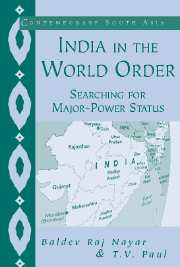Book contents
- Frontmatter
- Contents
- Acknowledgements
- 1 Introduction: India and Its Search for a Major-Power Role
- 2 Major-Power Status in the Modern World: India in Comparative Perspective
- 3 The Constraints on India: International and Domestic
- 4 Nehru's Grand Strategy for a Major-Power Role, 1947—1964
- 5 Strategy in Hard Times: The Long March for Capabilities, 1964—1990
- 6 After the Cold War: Adaptation, Persistence and Assertion, 1991—2001
- 7 Conclusions: India and the Emerging International Order
- Bibliography
- Index
4 - Nehru's Grand Strategy for a Major-Power Role, 1947—1964
Published online by Cambridge University Press: 05 July 2014
- Frontmatter
- Contents
- Acknowledgements
- 1 Introduction: India and Its Search for a Major-Power Role
- 2 Major-Power Status in the Modern World: India in Comparative Perspective
- 3 The Constraints on India: International and Domestic
- 4 Nehru's Grand Strategy for a Major-Power Role, 1947—1964
- 5 Strategy in Hard Times: The Long March for Capabilities, 1964—1990
- 6 After the Cold War: Adaptation, Persistence and Assertion, 1991—2001
- 7 Conclusions: India and the Emerging International Order
- Bibliography
- Index
Summary
Presiding over modern India's destiny as the country's first prime minister and foreign minister for a long and continuous period of seventeen years, Jawaharlal Nehru played a pivotal role in shaping India's foreign policy, not only for his time but, through his legacy, for the remainder of the twentieth century. Although deeply conscious of India's severe constraints, Nehru was nonetheless convinced that India was destined to be a key player in the international system. Nehru saw his own role as advancing the country along the path of achieving that prospect, through a wide-ranging set of policies. Moreover, he believed that the country's future potential demanded that India play an activist role in international affairs in the here and now in order to secure the interests both of India and of humanity at large. Analysts differ, however, as to whether Nehru was driven in his policy by realism (power politics) or idealism, concepts that he himself explicitly discussed.
One school of thought, most notably represented by the eminent Indian strategic thinker K. Subrahmanyam, holds that Nehru had really been a practitioner of realism and balance-of-power policy. If India under Nehru was, indeed, practicing a balance-of-power policy as between the superpowers, then it follows that Nehru must have considered India to be a major power to assume playing the role of a balancer. Subrahmanyam acknowledged that in the execution of Nehru's policy there may have been errors, but he believed that overall Nehru had acted in accord with the tenets of realism.
- Type
- Chapter
- Information
- India in the World OrderSearching for Major-Power Status, pp. 115 - 158Publisher: Cambridge University PressPrint publication year: 2002
- 1
- Cited by



